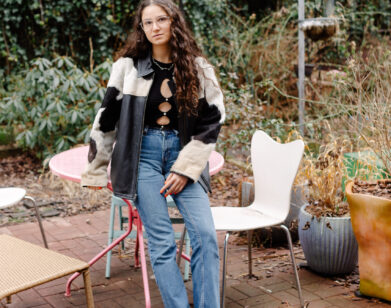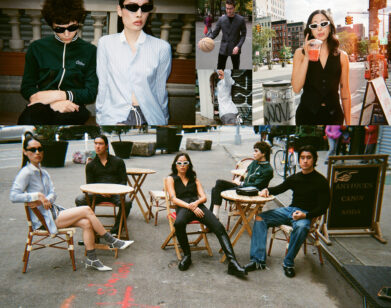from Dimes Square to the world
The Drunken Canal is Making aPortable Version of Downtown New York
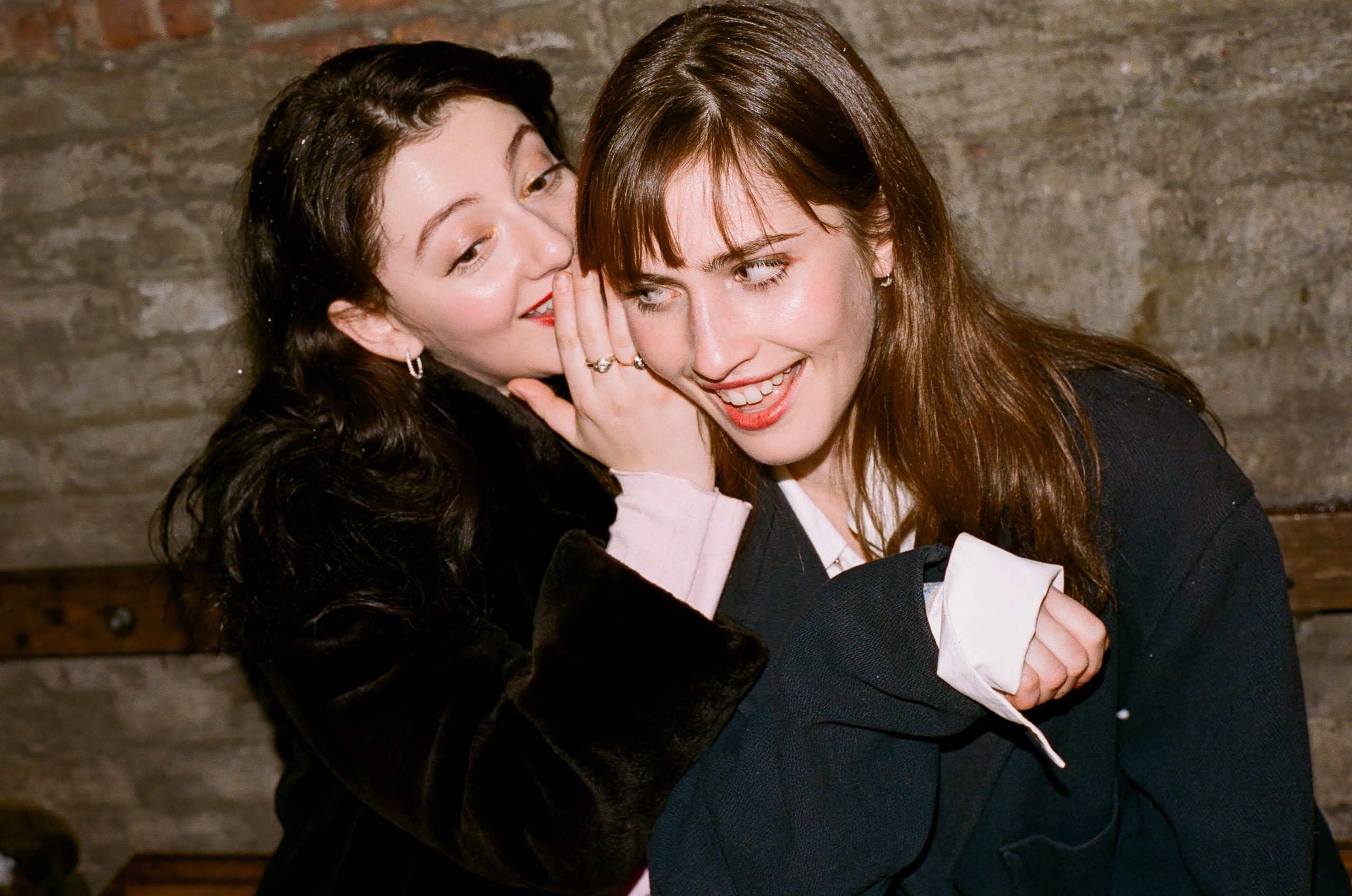
Photo by Cobey Arner.
Does Dimes Square actually exist? It depends on who you ask. The area of Lower Manhattan that sits at the intersection of Canal and Division Street, named after the eponymous restaurant, is a place many New Yorkers love to hate. Ostensibly, the square looks like many others in the area, with young people mulling around quaintly designed shops and bars. But to some, Dimes Square is the epicenter of a certain strain of New York’s downtown creative class. And while trying to explain a scene is an act of futility, if someone were to try to describe Dimes Square, they’d probably show you a copy of its very own newspaper, The Drunken Canal.
Launched last summer by Lower East Side locals Claire Banse and Gutes Guterman, The Drunken Canal is a patchwork of classifieds, baking recipes, columns, horoscopes, love letters, and more, ranging in tone from the politically matter-of-fact to feigned gossip. Their February issue, which was Valentine’s themed, included crypto stock tips from the writer Dean Kissick, as well as an interview between Cat Marnell and Caroline Calloway. Initially, the only way to get a copy of the newspaper, without knowing them, was to physically pick one up from a newspaper cubby that they had repurposed, located at Dimes Square. Though now, with their recent boom in popularity, they’ve expanded to shipping nationwide.
It requires a certain level of romanticism to start a newspaper in the contemporary landscape of New York City, which on one end is seeing a rise in mass unemployment and the closing of beloved cultural institutions, and on the other, unfathomable wealth, corporatism, and influencer culture. But it is a standard reaction for scenesters to offer a return to innocence in the face of turmoil. Overall, the newspaper reads like a downtown-themed combo of the New York Post, Gawker, and the New York Daily News, compiled by a generation just a couple years shy of being able to remember where they were on 9/11.
I spoke with Banse and Guterman of The Drunken Canal about whether print is dead. (Hint: it’s not.)
———
PATRICK MCGRAW: Why a newspaper?
CLAIRE BANSE: It was in part a response to how oversaturated with news everybody was during the pandemic, and still is to some extent. Sitting in front of our computers 24/7, and constantly watching news come in on Twitter and Instagram. There was almost this pressure to post about everything that was happening, to respond to it.
GUTES GUTERMAN: The news aspect isn’t as pertinent now as it was in the beginning. But it is news in the sense that it’s a timestamp of the present moment, which is why I still feel qualified to call it a newspaper. Everyone is writing about something that’s happening, even if it’s not breaking news. It’s a summation, and what is a newspaper if not a summation?
MCGRAW: I thought print was dead?
GUTERMAN: Print media never actually left, it just got less interesting. So maybe we’re making it interesting again.
MCGRAW: Where did the initial idea come from?
BANSE: It started last summer, during the really dark peak of the pandemic. We would meet in Tompkins Square Park to hang out, basically every single day. One day when we went to go get drinks at the local bodega, we got a New York Daily News and started reading it aloud, ridiculous puns and all.
GUTERMAN: At the time, Claire’s foot was broken and we were using the ice from our Aperol Spritz to ice her foot. So we were just sitting there icing her foot, reading the Daily News, and we thought, ‘What if there was a way we could put our banter into print? What if we could make our own crazy headlines, like the Daily News, but of our own banter?’
MCGRAW: So the pandemic was pretty influential.
BANSE: There was so much performative posting going on in the early days of the pandemic. It seemed as though so many people were getting canceled, and people were posting just to make sure that everyone knew that they were informed, that they were doing something, or were going to a certain place that they felt they had to go to. Being in print helps us avoid a lot of that. It frees us from those temporary pressures—from having all the eyes on us.
MCGRAW: And putting something in print is a different type of performance.
GUTERMAN: It’s a self-performance. You’re doing it for yourself, instead of for your Instagram audience. Ultimately, there’s so much stuff that looks better on paper than on a screen.
BANSE: A lot of things we do don’t really come to life until you’re holding it in your hand as opposed to seeing it on Photoshop. There’s something so nice about having this big awkward newsprint and holding it, and the juxtaposition of it being about a world that is so online.
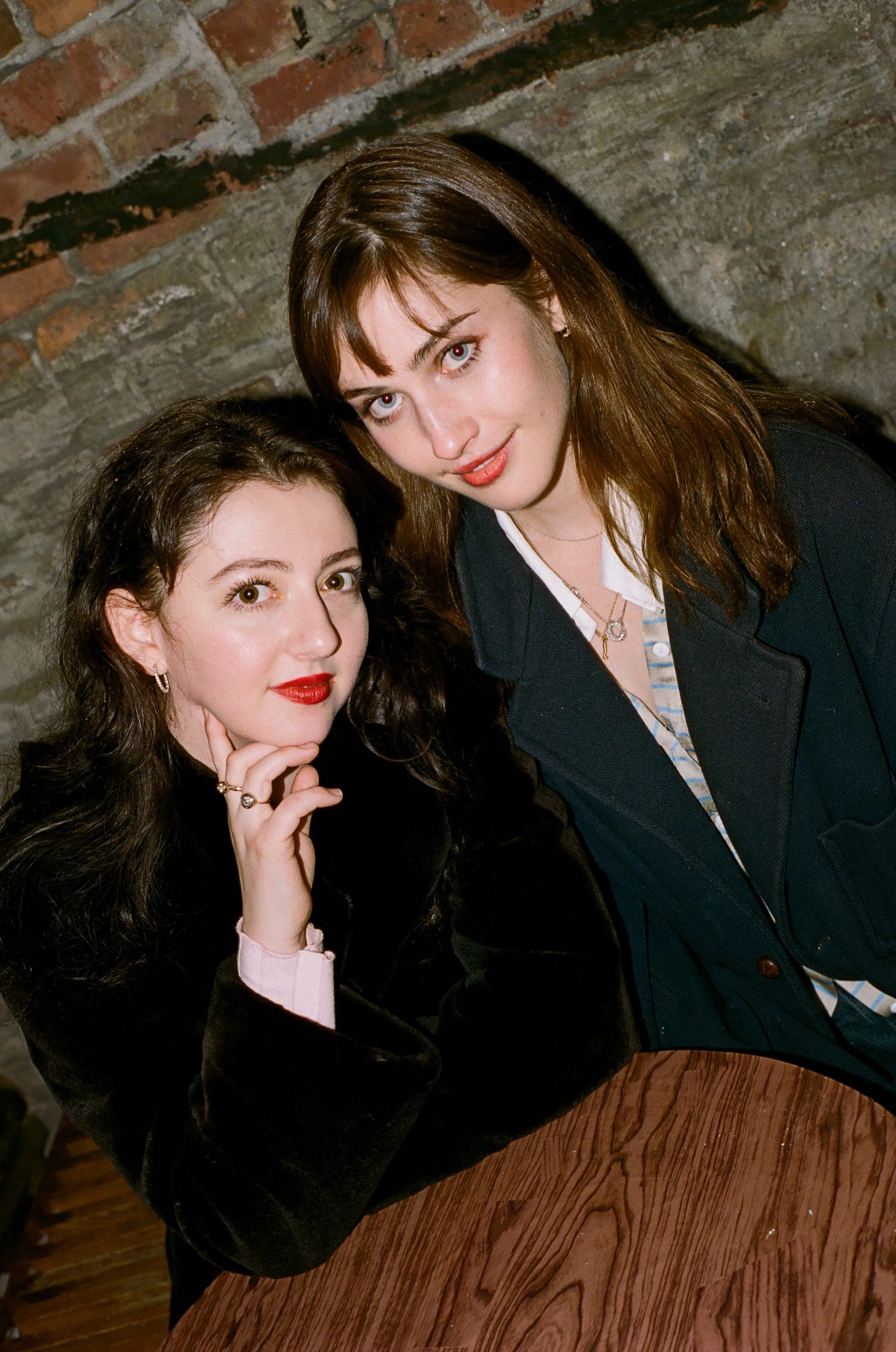
Photo by Cobey Arner.
MCGRAW: How do you guys decide on what type of content you publish?
GUTERMAN: We just go off our feelings. With submissions, we have to imagine that someone from Dimes Square would see themselves in the piece. For instance, with the last issue, we published a proper news piece because we felt that that’s what the issue needed. It’s honestly just an intuitive process for us—there’s no protocol, there’s no set of rules. If we read it and we like it, and we think it does something, we publish it. It’s about making sure that each page is kind of like a content dance.
BANSE: Content dance. I like that.
MCGRAW: What about your attitude towards cancel culture? I’m thinking of the list of canceled people that you guys published (sarcastically) in the most recent issue.
BANSE: When it comes to cancel culture, I’m at a point of such exhaustion. There’s no way for somebody to be totally correct 100 percent of the time. Cancelling somebody just seems to be such a weird performative thing where people say “I got them, I got you!” So for the first issue we did this roundup of everybody who had recently been canceled, and people really liked that, so we did it again for the February issue. Because there’s this whole other issue of people getting canceled literally just for liking someone who was canceled, so we published the list as a kind of warning. We like our readers to be informed.
GUTERMAN: There’s definitely people that deserve to be canceled, but for the most part people should be held accountable instead of canceled. That’s enough.
MCGRAW: How important is Dimes Square to the newspaper? A number of people have tried to tell me that Dimes Square isn’t real.
GUTERMAN: We never set out to chronicle Dimes Square. We wanted to make something that was a tunnel vision of our life, and that included chronicling the places around us. Then we realized that Dimes as an idea is hilarious. It’s funny, it’s absurd, and it’s so quintessentially New York. You have all these creative types slinking around with their tote bags buying eight dollar juices and then chain smoking cigarettes.
BANSE: It’s so easy to make fun of Dimes Square, to make a meme of it, and to make fun of yourself through Dimes. And because people can see themselves in it, they feel like they’re part of the joke. That kind of brought everybody together.
MCGRAW: Can you differentiate the scene from the content? Has The Drunken Canal become the scene?
BANSE: Well, it’s definitely a scene now, but also more a cast of characters that we’ve been hanging out with for a long time. Now it’s growing pretty rapidly, but originally it was just a joke with our friends. Some of the stuff, especially in the second issue, is very hyper-specific inside jokes.
GUTERMAN: Some people might say it’s a scene. I don’t think I would go so far as to say that.
BANSE: Especially during COVID, it’s difficult to have a scene. It would be a scene if we could throw real parties and stuff like that.
MCGRAW: Obviously at this point the audience is too big to just be people from Dimes Square.
BANSE: For a lot of people it’s almost like a transportable version of Dimes Square, or New York in general. So a lot of people who had to leave New York during the pandemic read it to feel that connection to New York.
GUTERMAN: We feel confident calling it a newspaper because you know, it’s not necessarily curated, it’s more just trying to gather a moment in time. For that reason, anyone can enjoy Dimes Square, from anywhere in the world. I mean, we’ve sent copies of the newspaper to Texas, Nashville, Montana, Hawaii, and we get people from Europe asking for copies. It works for that reason, it makes everybody feel included, even if it is super niche at times.
MCGRAW: How did you two meet?
BANSE: We still haven’t figured that out. We don’t know exactly.
GUTERMAN: Yeah, I don’t know when we met for the first time. All I know is there was one night where we crossed paths and had a lot of fun together, and then it happened again two days later. I remember one early night where we were all at a jazz club. I think I was going through a chaotic, difficult time, and Claire, without even realizing it, made me excited to be alive again. Nobody has been able to make me feel as thrilled about the little things in life.
BANSE: I was going through a psychotic time as well. I was really just going ham, and I think Gutes has really grounded me.
GUTERMAN: Exactly. I think I ground Claire, and Claire brings me up, and that’s why it works.
MCGRAW: Is this what you two envisioned yourselves doing?
BANSE: It makes a lot of sense that this is what we’re doing. I was always kind of obsessed with downtown culture, and scenes and stuff like that, as corny as that sounds. Everyone who moves to New York has their own vision of a scene, with all this stuff going on. Growing up, I was always really obsessed with different time periods and that kind of shit. So, with The Drunken Canal, it feels like we can chronicle our own scene that is or isn’t happening.
GUTERMAN: I’ve always been good at bringing people together, especially really disparate groups of people. But when we started The Canal I by no means thought it would turn into this. We thought it was going to be a joke. A serious joke, but a joke. Now I get why people resonate with it, but this was by no means our intention.
MCGRAW: It’s crazy how quickly you guys have been able to get the newspaper up and running and growing.
GUTERMAN: I mean, it took us a couple of months to get the ball rolling, then we just did it. We used to walk around and just scream, “Yeah, we’re starting a newspaper!” Then one day we went to Queens and picked it up. Everybody was like, “What the fuck is this? We thought you were joking.”
BANSE: The only reason it worked is because we said fuck it, and did it. If we sat around and thought ‘What will people think?’ or ‘What do we know about the world of media?” it never would have worked. The only reason it happened is because we were excited and wanted our friends to have a good time and laugh and be happy during a time that was so dark and depressing.
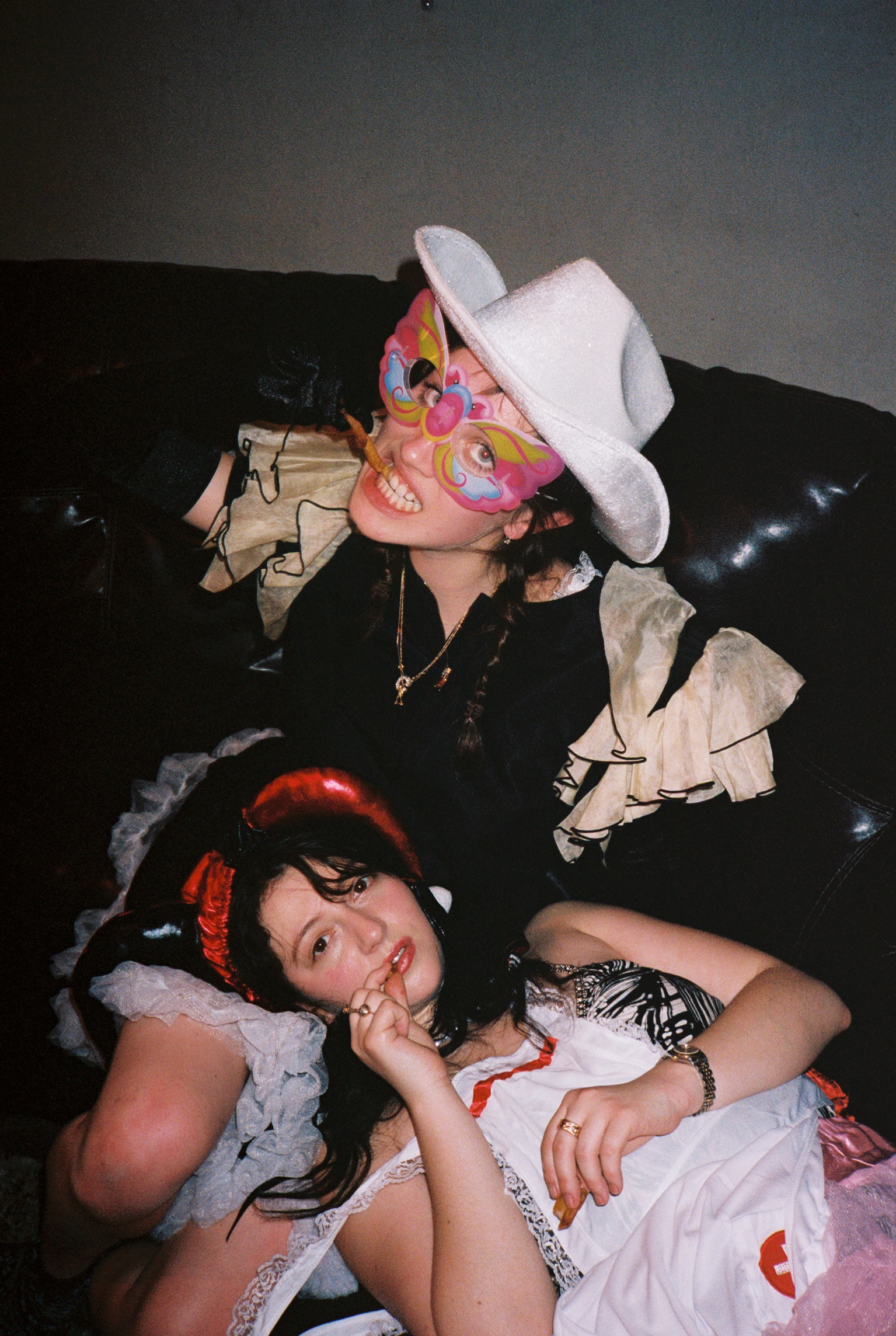
Photo by Leia Jospé.
MCGRAW: Speaking of which, how did you guys keep it together during COVID?
BANSE: We threw a bunch of Zoom parties, where we did things like read the script from The Godfather, or movies we haven’t seen.
GUTERMAN: Yeah, they were really self-indulgent. I bought a mini-trampoline and Zoom’d with it for one week, but then I sprained my ankle. Maybe it will make a reappearance when it gets warm again.
MCGRAW: What can we look forward to in the March issue?
GUTERMAN: Some Bachelor fanfic, a Halloween store tribute spread.
BANSE: A lot of March themes; some suggestions of what to give up for lent. Lots of stuff about the color green.
———
The March issue of The Drunken Canal will be released on March 5th.





